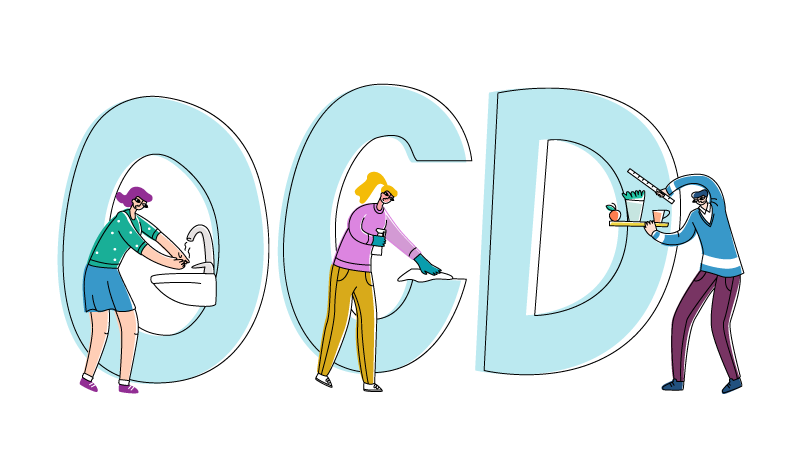A Guide To Manage Your Anxiety
Anxiety is the most common mental health condition in the United States. Know your options for treating anxiety.
What are Anxiety Disorders?
Anxiety is a mental health condition characterized by feelings of nervousness and anxiety. These feelings can be about many things or certain situations or activities. These fears are often inappropriately placed and intense.
Typical “symptoms” include excessive worry, inability to control your worries, feeling restless, difficulty concentrating, irritability, tiredness, nausea, and muscle pain. The feelings are usually present for most days, last for 6 months or longer, and impair day-to-day functioning, including work, school, self-care, and interpersonal relationships.
Three types of anxiety
Anxiety is often described as “inappropriate” fear. For example, if you were walking into the woods and came across a bear and felt fear, this would be a healthy response as it tells you that you are in danger and you have to respond quickly to the situation. However, it’s not healthy if you go about your day-to-day life with that same feeling of terror just in case you run into a bear. When this restlessness and anxiety starts to interfere with your life, this is when it is time to seek treatment.
Types of Anxiety Disorder
It is very important to differentiate between the various types of the condition.
Generalized anxiety disorder (GAD)
GAD is the most common form of anxiety. The feelings of nervousness and excessive worry are about multiple different situations or activities and occur on most days for at least 6 months.
Social anxiety disorder (SA) is more specific.
The anxiety is centered around social situations and interpersonal relationships. The most common anxieties experienced are that of being judged or embarrassed in front of others. This can occur in all social situations or can be specific to certain circumstances such as social gatherings.
Panic disorder (PD)
Panic disorder is another specialized form of anxiety, characterized by sudden and repeated attacks of uncontrollable, intense anxiety. This bout of severe anxiety is called a “panic attack”, and can present as a racing heart, sweating and chills, difficulty breathing and speaking, uncontrollable crying, stomach pain, and a feeling of being out of control. Panic attacks are scary and upsetting, so people with panic disorder often live in fear of experiencing one, which perpetuates their mental health condition.
If you think you may fit the criteria of an anxiety disorder, it is important to speak with your healthcare provider as there are many treatment options available for these conditions.
Medications on our Wholesale Price List
Each medication costs $70 for a year or $37 for 6 months with free shipping.
Treatment options
The treatment for anxiety depends on the anxiety disorder you have been diagnosed with. However, in general there are three main ways to manage anxiety: self-management, talk therapy, and/or medication.
Self-management
This kind of management is recommended for most people with anxiety regardless of other additional treatments. The treatment includes learning grounding techniques, modifying your lifestyle, and meditation.
Talk therapy
Talk therapy is is guided by a professional mental health care provider. The types of therapy will differ based on your own personal needs and preferences, but could include cognitive behavioural therapy, exposure therapy, interpersonal therapy, dialectical behaviour therapy, and/or psychodynamic therapy.
Medications
In general, antidepressants are the first-line therapy for anxiety. However, certain benzodiazepines and antipsychotics can also be prescribed in certain situations.
Medications for Anxiety
There are five major classes and antidepressants, all of which have their differences; advantages and disadvantages. Learn more about the medications in each of these drug classes below:
Selective serotonin reuptake inhibitors (SSRIs)
Serotonin norepinephrine reuptake inhibitors (SNRIs)
What to Expect During the First Few Weeks on Antidepressants
Most antidepressants work by decreasing the reuptake of serotonin and/or norepinephrine and/or dopamine. In a normal situation, these chemicals would be released by one cell in the brain and go signal another cell in the brain. “Reuptake” of these chemicals removes the chemical from the space between these two nerve cells and therefore stops them from having any more activity. Decreasing reuptake gives the chemicals more time to act, which then has a positive impact on mood and anxiety disorders.

Obsessive Compulsive Disorder
OCD is characterized by obsessions (reoccurring, repeated, unwanted thoughts) and compulsions (urgent drives to repeatedly complete certain tasks). In general, the compulsions are completed in order to (temporarily) relieve the obsessive thoughts. However, the thoughts return, and the cycle continues.
These obsessions and compulsions cause significant distress and interfere with day-to-day functioning. There are, however, medications and therapies that can help relieve these thoughts and actions. It is therefore essential to speak with a healthcare professional if you think you may be experiencing symptoms of OCD.
Medications approved to treat OCD:
Treating OCD with Medication
OCD is a mental health condition that frequently requires medication treatment. The medication is sometimes just used to calm the brain down and therefore let you work away from your obsessions and compulsions. Sometimes, however, it can be indefinite, and you may remain medicated as long as you and your healthcare provider see fit.